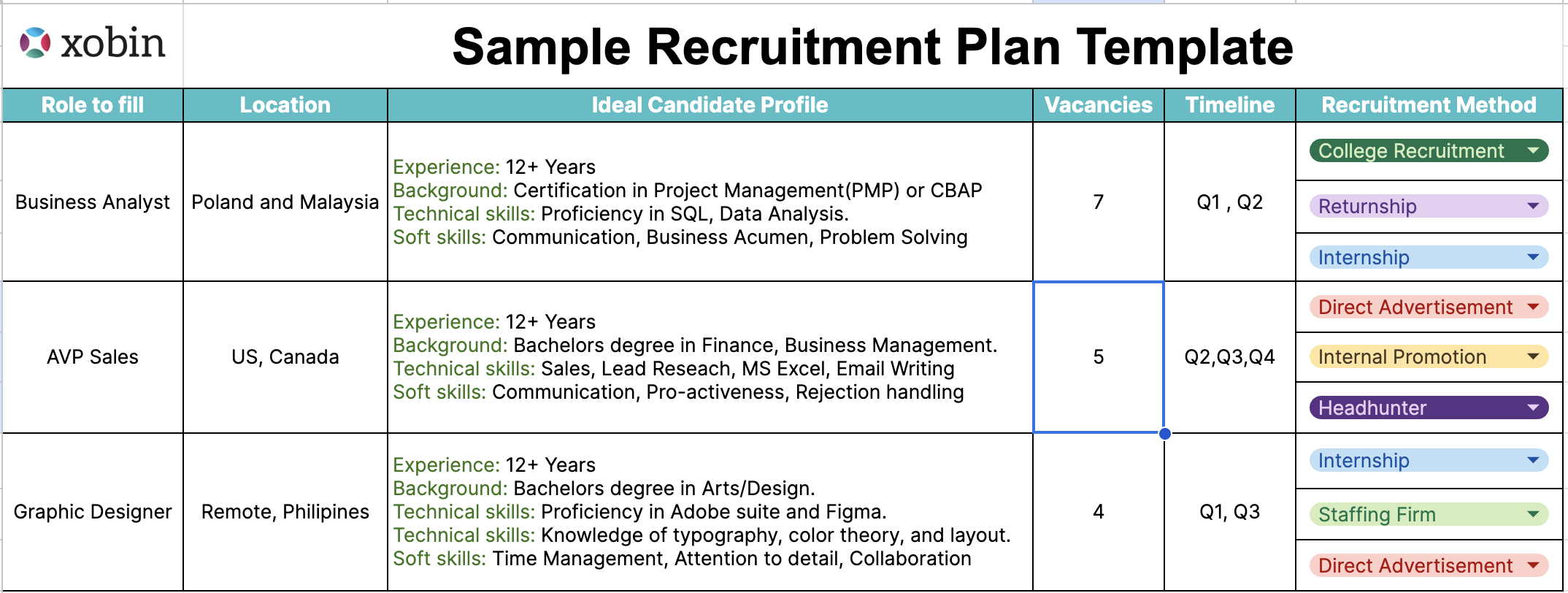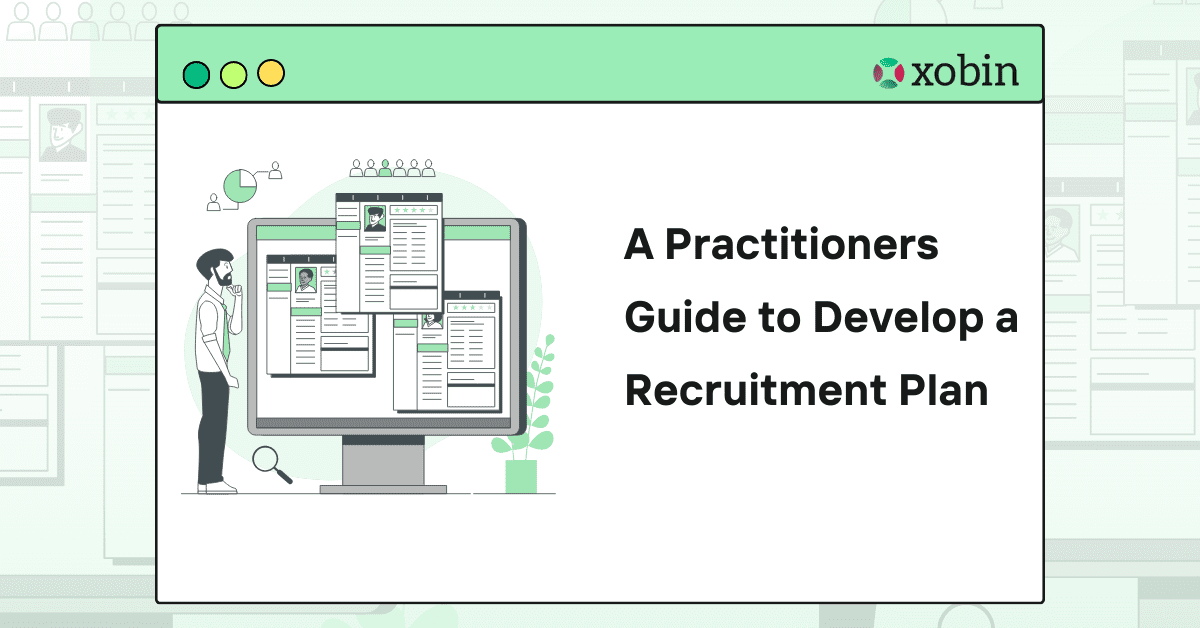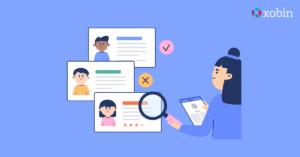Recruiting top talent ranks among the biggest challenges businesses face today. Without a clear and thoughtful recruitment plan, attracting the best candidates becomes a tough task. As competition grows across all industries, companies now look for smarter ways to improve their hiring process. By using AI recruitment tools, they aim to find the right talent quickly and effectively.
Table of Contents
So, how can you build recruiting plans and strategies that bring success and help you hire and keep top talent? This guide explores key strategies to create a smooth and effective recruitment plan that matches your company’s goals.
TL;DR – Key Takeaway!
- A hiring plan actively guides how companies attract and select qualified candidates. It outlines the steps, timeline, and tools needed to find and hire the best talent.
- Recruitment plans Align hiring with business goals to attract and retain top talent efficiently.
- Clear goals and detailed job descriptions are the foundation for targeted recruitment success.
- Leverage data analytics and AI tools to streamline hiring, reduce costs, and improve candidate quality.
- Pre-employment skills and psychometric tests ensure the right technical and cultural fit.
- Video-first platforms and automated communication enhance candidate experience and engagement.
- Collaborate with hiring teams for aligned, consistent recruitment decisions.
- Scalable recruitment strategies use AI-driven automation to handle growing hiring demands effortlessly.
- Measure recruitment success with data-driven reports to continuously refine your hiring process.
- Xobin offers end-to-end automated hiring solutions from video applications to AI-based assessments to hire smarter, faster, and cost-effectively.
What is a Recruitment and Hiring Plan?
A recruitment plan is a detailed roadmap that shows how a company will attract, screen, evaluate, interview, and hire top talent. Unlike a basic hiring strategy, a strategic recruitment plan connects the recruitment process with the company’s overall goals. It goes beyond just filling open roles by making sure each new hire supports the company’s long-term success.
Instead of hiring reactively, companies use this plan to align talent acquisition with long-term business goals and stay competitive in the market.

Building a solid recruitment plan is key to optimizing the hiring funnel, improving the candidate experience, and cutting down on hiring costs. However, creating a strong recruitment strategy plan takes careful planning, the right tools, and ongoing improvement.
With a clear recruitment plan, companies can align their workforce with business goals and maintain a competitive edge.

1. Job Analysis
Start by defining the role clearly. Use job descriptions, expert interviews, and surveys to identify the key skills, qualifications, and experience needed.
2. Sourcing Strategy
Then, build a plan to reach the right candidates. Use job boards, social media, employee referrals, professional networks, and hiring events to attract talent.
3. Selection and Screening
Next, decide how to assess candidates. Include interview formats, evaluation criteria, background checks, and pre-employment tests in your plan.
4. Onboarding and Retention
After hiring, focus on smooth onboarding. Offer training and support to help new employees succeed and stay engaged in the long run.
5. Evaluation and Improvement
Finally, track your results. Monitor time-to-hire, cost-per-hire, and candidate experience to improve your hiring process over time.
12 Smart Ways to Build a Scalable Recruitment Plan that Works
1. Start with Clear Goals
The first step in crafting a recruitment plan is understanding your company’s hiring needs. It’s important to know exactly what roles need to be filled and what skills are necessary. Consider both your immediate and long-term hiring goals.
A great way to start is by collaborating with department heads to understand their talent needs. By aligning recruitment goals with overall business objectives, you can tailor the hiring strategy to support both short-term projects and long-term growth.
2. Create Detailed Job Descriptions
One of the most crucial elements in any recruitment plan is the job description. A detailed and well-crafted job description helps ensure you’re targeting the right candidates for the role.
Your job descriptions should:
- Clearly outline key responsibilities.
- Specify the required qualifications.
- Highlight the desired skills and competencies.
- Include a strong emphasis on company culture and values.
It’s important to use clear language to avoid ambiguity and attract candidates who are genuinely interested in the role.
3. Use Data-Driven Insights to Improve Your Hiring Process
The best recruitment strategies are backed by data. By analyzing past hiring data, you can optimize your recruitment plan for better results.
Key metrics to track:
- Time to hire: How long does it take from posting the job to making an offer?
- Quality of hire: How well do the new hires perform after joining?
- Cost per hire: How much does it cost to recruit a new employee?
- Candidate source tracking: Which channels produce the highest quality candidates?
By collecting and analyzing these recruitment metrics, you can continuously improve the recruitment process, ensuring it’s as efficient as possible.
4. Leverage Technology to Streamline the Process
Technology plays a crucial role in a recruitment plan. By adopting the right tools, you can automate many manual tasks, reduce time to hire, and ensure better quality hires.
For example, automating the scheduling of interviews with automated video interviews can help eliminate scheduling delays and provide a seamless experience for candidates. Likewise, using AI-driven candidate evaluation tools can automatically assess and rank applicants based on skills, experience, and other relevant criteria.
These tools not only save time but also help eliminate bias from the recruitment process, allowing for more objective hiring decisions.
5. Implement Pre-Employment Testing
One of the most effective ways to evaluate candidates is through pre-employment testing. It allows you to assess a candidate’s skills, personality, and cognitive abilities before making a hiring decision.
By incorporating customizable skills tests into your recruitment plan, you can evaluate candidates for specific roles using pre-employment tests. These tests can help you assess:
- Technical skills (e.g., coding assessments for software developers)
- Cognitive abilities (e.g., logical reasoning and problem-solving)
- Soft skills (e.g., communication and emotional intelligence)
This objective testing approach gives you deeper insights into each candidate’s true abilities.
6. Focus on Cultural Fit with Psychometric Testing
While hard skills are essential, soft skills and cultural fit play a significant role in a candidate’s success within your organization. Implementing psychometric testing as part of your recruitment process helps assess a candidate’s personality traits and cognitive abilities.
Psychometric tests evaluate attributes such as
- Emotional intelligence
- Cognitive reasoning
- Personality traits
By evaluating candidates for both skill and cultural fit, you ensure that the new hires align with the values and culture of your business, which leads to higher job satisfaction and reduced turnover.
7. Simplify Application Process with Video-First Platforms
Simplifying the application process can significantly improve your candidate experience. Using a video-first applicant management platform like XoForms, candidates can submit video responses to application questions, helping you evaluate their communication skills right from the start.
Additionally, this video-based approach helps you assess a candidate’s confidence, articulation, and overall presentation skills, making it easier to identify candidates who are a good fit for client-facing or leadership roles.
8. Automate Candidate Communication
Managing candidate communication can be time-consuming, especially as the volume of applicants increases. Automating communication with candidates ensures timely updates and keeps candidates engaged throughout the hiring process.
An AI-driven communication checker can help evaluate a candidate’s written communication skills, allowing you to make informed decisions about their suitability for the role. Additionally, automated email responses and interview reminders ensure a smooth process from start to finish.
9. Collaborate with Hiring Teams
Creating a recruitment plan is not a solo endeavor; it involves collaboration. HR teams, hiring managers, and department heads need to work together to ensure the plan aligns with both the technical and cultural needs of the business.
Encourage regular feedback and discussions to refine the recruitment strategy. Utilizing a collaborative hiring approach ensures that all stakeholders are on the same page, helping reduce discrepancies in the evaluation process.
10. Optimize for Scalability with AI and Automation
For businesses that plan to scale quickly, your recruitment plan should be scalable as well. By integrating AI-driven recruitment assistants like Xobin Copilot, you can automate many tasks such as candidate screening, interview scheduling, and assessment evaluations.
This approach reduces the burden on recruiters and HR staff, allowing them to focus on high-priority tasks while AI handles the repetitive work.
11. Assess Tech Talent with Real-Time Coding Challenges
For companies hiring for tech roles, it’s essential to assess candidates through coding assessments. Real-time coding challenges help evaluate how well candidates can solve problems under pressure. These challenges are particularly valuable for roles that require deep technical knowledge and proficiency in various coding languages.
Providing candidates with a diverse range of coding languages to choose from in assessments ensures you can evaluate their skills based on the specific technologies you use in your business.
12. Measure Success with Data-Driven Reports
Once you’ve implemented your recruitment plan, it’s crucial to track and measure its success. Detailed, actionable candidate reports provide insights into candidate performance during assessments and interviews. These reports help you make data-backed hiring decisions by offering detailed feedback on each candidate’s strengths and weaknesses.
With exportable reports, you can share key insights with hiring teams and use the data to continuously improve your recruitment strategy.
Why Should Xobin Be Your Recruitment Partner?
At Xobin, we understand that hiring the right candidate at the right time is business-critical. That’s why we provide
- Simplify and speed up job applications with XoForms, a video-first applicant platform designed for better candidate experience.
- Seamlessly manage the entire hiring journey: applications, assessments, and interviews with Xobin’s powerful ATS.
- Assess any role with 3400+ custom skills tests and 2500+ job-based assessments using Xobin’s Pre-Employment Testing suite.
- Make smarter hiring decisions through psychometric tests, AI-driven communication checks, and personality assessments.
- Hire top tech talent faster with coding assessments, tech interviews, and support for a diverse range of coding languages.
- Ensure fair and secure tests with AI Web Proctoring, EyeGazer technology, and test timers that maintain integrity at scale.
- Save time with automated video interviews, AI Evaluate, Xobin Copilot, and auto-generated, export-ready reports for data-driven decisions.
Whether you’re a startup or an enterprise, Xobin helps you hire smarter, faster, and more cost-effectively. Book a personalized demo and start your journey with Xobin today to build a hiring strategy that scales with your success.
Frequently Asked Questions (FAQs)
1. What is a recruitment plan, and why is it important?
A recruitment plan is a strategic roadmap outlining how a business attracts, evaluates, and hires talent. It ensures alignment with company goals, improves hiring efficiency, reduces costs, and enhances candidate experience.
2. Can I scale my recruitment plan for future growth?
Yes, by integrating AI tools, automation, and scalable platforms like Xobin, your recruitment plan can handle increased hiring needs without compromising quality.
3. Why should I choose Xobin to manage my recruitment plan?
Xobin offers an end-to-end AI-driven hiring solution with 3400+ skill tests, psychometric evaluations, AI-powered tools, ATS, and secure testing, making it ideal for scalable, efficient recruitment.
4. What is the role of data analytics in recruitment planning?
Data analytics helps HR teams track key metrics like time-to-hire, cost-per-hire, and candidate source effectiveness. These insights allow businesses to refine recruitment strategies continuously and make more informed hiring decisions.






